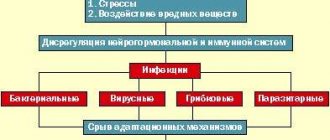Weakness occurs with many diseases, so it is almost impossible for a non-specialist to immediately determine what happened. Weakness in the legs is a very nonspecific symptom that can accompany disturbances in the functioning of many organs and systems. However, such a symptom should never be ignored, since even after heavy physical activity, weakness should go away after a short rest. If weakness in the legs occurs for no apparent reason, much less repeats repeatedly or its severity intensifies, you should consult a doctor immediately.
As mentioned earlier, there are many reasons for weakness in the legs; accordingly, the patient is faced with the question - what specialty should he see a doctor? Most often, such a specialist becomes a neurologist, and a little less often a therapist and an orthopedic traumatologist.
At CELT you can get advice from a neurologist.
- Initial consultation – 3,500
- Repeated consultation – 2,300
Make an appointment
Causes of weakness in the legs
Conventionally, the reasons can be divided into several groups:
- damage to the vascular system;
- muscle damage;
- damage to peripheral nerves;
- diseases of the central nervous system (brain or spinal cord);
- psychological and mental problems;
- joint diseases;
- diseases of the spine;
- intoxication.
During the initial examination and history taking, special attention is paid to the dynamics of the process - whether the weakness arose suddenly or gradually increased, whether it is constant or intermittent, and so on. It is important to find out not only the events that preceded the appearance of weakness in the legs, but also the accompanying symptoms: pain, swelling, convulsive twitching, dizziness, change in skin color, trembling, fever, degree of movement impairment, and the like.
A comparison of clinical and laboratory data allows you to quickly understand which disease of which organ or system caused weakness in the legs. CELT doctors have at their disposal an excellent diagnostic base, with the help of which they can determine not only the disease itself, but also how long it has existed, as well as its severity and prognosis.
Weakness due to infectious diseases
Most infectious and viral diseases occur against a background of gradually increasing malaise and general deterioration in well-being, especially while the virus or infection is in the process of reproducing. Weakness in such cases is combined with fever, headache, intestinal disorders and digestive disorders, sleep disturbances, vomiting, dry cough, and nasal congestion. Skin rashes, sore throat, drowsiness, and swollen lymph nodes are possible. The condition is directly related to the intoxication that has occurred in the body. The course of an infectious disease is possible without fever, especially in patients with weak immunity. A person has a headache and a sore throat, he sleeps a lot and practically does not eat. Such symptoms are characteristic of the acute course of infectious diseases. Weakness may not be accompanied by other pathological manifestations - in this case we can speak of an asymptomatic course.
It is interesting that during the day the patient’s condition is not the same: if in the morning after waking up he feels relatively cheerful, then after lunch and in the evening the temperature rises and all the symptoms of malaise intensify.
Our doctors
Pankov Alexander Rostislavovich
Neurologist
40 years of experience
Make an appointment
Novikova Larisa Vaganovna
Neuropathologist, Candidate of Medical Sciences, doctor of the highest category
Experience 39 years
Make an appointment
Circulatory disorders
Vascular diseases of the nervous system, which can result in stroke and heart attack, are becoming more common among patients. In this case, situations of so-called transient ischemic attacks are possible, when a “flickering” of symptoms occurs - weakness occurs acutely, but quickly passes. After such an incident, you cannot be complacent and assume that everything turned out okay. It is necessary to identify the cause of the incident as quickly as possible and take appropriate preventive measures.
Stroke and heart attack can occur not only in the brain, but also in the spinal cord. A spinal stroke that occurs at any level can leave a person disabled or require a long and incredibly labor-intensive recovery. It must be said that due to the structure of the spinal cord, recovery after a spinal stroke is rarely successful, even in comparison with a stroke that affects the brain.
Weakness in the limbs may result from myocardial infarction, in which case gastrointestinal symptoms are often associated - nausea, abdominal pain, bloating. Some forms of heart attack thus remain undiagnosed, since the clinical picture is not typical and “imitates” an acute disease of other organs (for example, acute pancreatitis).
The veins or arteries of the lower extremities may be affected. Chronic venous insufficiency not only reduces physical strength, leads to pain and causes aesthetic problems, but also threatens the formation or separation of a blood clot (which, if the circumstances are unsuccessful, can block the pulmonary artery - pulmonary embolism is often a fatal condition). Blood stagnation also occurs in chronic heart failure, when swelling appears in the legs.
The formation of atherosclerotic plaques in the lumen of the vessel is a common cause of gait disturbance in the elderly. The so-called “intermittent claudication” develops.
Obliterating endarteritis also manifests itself as intermittent claudication, when the lumen of the vessels gradually narrows. Raynaud's disease is manifested by changes in skin color, weakness and swelling, the trigger for which is often hypothermia or frostbite. Menopause and premenstrual syndrome can also cause transient leg weakness.
Features of the clinical course of asthenia after Covid
From a medical point of view, asthenic syndrome is the body’s reaction to a condition fraught with loss of energy resources. And a decrease in activity is a universal biological mechanism for preserving life potential according to the principle: less activity means less need for energy.
The following symptoms are characteristic of asthenic syndrome:
- muscle weakness;
- drowsiness;
- decreased endurance;
- deterioration of memory, attention, ability to concentrate, absent-mindedness;
- pain in the chest, spine, abdomen;
- tachycardia, shortness of breath;
- anxiety, mood swings, fears, suspiciousness - a person constantly listens to his own feelings, fears a relapse of the disease, which further aggravates his well-being;
- weight loss;
- in men - erectile dysfunction and decreased libido, in women - menstrual irregularities;
- increased sensitivity to light, sound and other external stimuli.
Important! Unlike normal, physiological fatigue, in this case the listed symptoms do not go away after sleep and rest.
Very heavy sweating after coronavirus is also typical. Hyperhidrosis manifests itself even with minimal physical activity, sometimes at rest.
Sensory disturbances due to nerve damage
This is the most common disorder in diabetes mellitus - polyneuropathy, which almost inevitably occurs 15 or 20 years after the onset of the disease, but everything can happen much earlier. Numbness, heaviness, and decreased sensitivity appear.
The same disorders occur with funicular myelosis or degenerative disease of the spinal cord, when deep sensitivity is immediately impaired.
Neurologists identify many causes of polyneuropathy - from viruses to chronic alcoholism. Among them are tick bites, cytomegalovirus, tumors, diphtheria, chemical poisoning and much more.
How to overcome fatigue?
When the body is faced with oxygen starvation, which occurs due to impaired blood circulation and metabolism, we feel powerless. Feeling dizzy, experiencing pain in the temples, and decreased concentration and productivity. If this happens, consult a doctor immediately. As they say, take care of your health from a young age, and they say it right.
But if we are not talking about pathological changes in the body, but about a functional disorder, then here are some tips on how to cope with fatigue and feel cheerful for the whole day.
- Sleep at least 7–9 hours a day. Try to accustom yourself to the correct daily routine: go to bed and wake up at the same time every day. Remember, healthy sleep is the key to feeling great. During sleep, our body recovers and gains strength.
- Cool shower. Water procedures in the morning can both invigorate and normalize the functioning of the cardiovascular system.
- Evening exercise. Taking a walk before bed is very beneficial, especially if you spent most of the day sitting.
- Fitness. You can exercise even at home; you don’t have to visit a gym or pay for the services of a personal trainer. Regular 15-minute warm-up in the morning or throughout the day improves blood circulation and restores vascular tone.
- Rejection of bad habits. Alcohol and smoking often cause serious disorders in the body, at a minimum they cause vasospasm and poor health
- Healthy diet. Overeating and addiction to fast food can also be classified as bad habits. To avoid problems with excess weight, start eating right. Eat more vitamins and other useful microelements.
- Phytotherapy. If your work involves regular stress and severe overwork, there is nothing wrong with drinking soothing or tonic infusions or teas made from chamomile, lemon balm, mint, valerian, rose hips, ginseng, strawberries, etc. This habit will help strengthen the immune system and, perhaps cope with nervous overload.
Psychological problems
Emotions influence our lives much more than we realize. The fact is that the body’s reactions are regulated by the autonomic nervous system, another name for which is the autonomic one. This system operates according to its own laws, regardless of our will and desires. Therefore, the body's reactions - heartbeat, breathing, blood circulation, digestion, spasms - practically cannot be regulated by willpower. Our every daily experience, and even more so mental illness, affects the functioning of all organs and systems.
Weakness in the legs occurs with the following disorders:
- panic attack;
- hysteria;
- prolonged stress;
- anxiety disorder;
- depression;
- schizophrenia;
- nervous exhaustion or neurasthenia;
- chronic psychotrauma;
- neurocirculatory dystonia.
Weakness due to diabetes
The main reasons why weakness can develop in a patient diagnosed with diabetes mellitus:
- overdose of insulin-containing drugs for type 1 diabetes;
- developing pathologies of the gastrointestinal tract, nervous system, kidney damage;
- diseases of the cardiovascular system;
- inadequate dosage of glucose-lowering drugs for type 2 diabetes;
- formation of one type of coma (hyperosmolar, ketoacidotic, hypoglycemic, lactic acidemic);
- consumption of alcoholic beverages;
- intense physical activity.
It is known that in the body of a patient with diabetes, some processes are disrupted. Due to improper functioning of the pancreas, insufficient insulin production occurs. Its lack and the development of resistance of cellular receptors to it leads to the fact that glucose does not enter the body tissues in the required concentration. Glucose, in turn, is a source of energy to maintain life. In addition, an increase in the concentration of glucose in the blood leads to its thickening, and the internal organs no longer receive the required amount of nutrients, because the blood flow to them is poorer. The result of such a violation is a feeling of weakness that haunts a diabetic.
Bone lesions
Weakness and decreased muscle strength in the legs may be the first sign of osteoporosis, or decreased bone mineral density.
Muscle tendons lose support. It is not uncommon for people who constantly use their limbs to suffer from a “stress fracture” of the foot. This happens when a critical mass of microtraumas accumulates from the same type of loads - from running, walking, jumping, jerking. Such injuries occur not only in athletes, but also in people constantly engaged in monotonous physical work.
Some bone tumors develop gradually and imperceptibly, so at first nothing but weakness bothers the person.
Anemia
Anemia (anemia)
- a condition characterized by a deficiency of red blood cells and a decrease in hemoglobin in the blood.
Hemoglobin
is an iron-rich protein that gives blood its red color. It helps cells transport oxygen from the lungs to the rest of the body.
The body of a person suffering from anemia simply does not receive enough oxygen, which is why one feels general weakness, fatigue, sudden changes in mood and “fog” in the head.
Common symptoms of anemia
Here are some of the most common symptoms of anemia that adults typically experience:
- fatigue, lethargy, lack of energy;
- pale skin;
- fast or irregular heartbeat;
- shortness of breath, breathing problems;
- chest pain;
- dizziness or loss of stability;
- decreased concentration;
- decreased body temperature;
- headache.
Treatment of anemia
First of all, the cause of regular fatigue should be clarified with your doctor. People tend to self-medicate, which is absolutely not worth doing.
Treatment of anemia can be either therapeutic or surgical. Therefore, you should not delay your visit to the doctor and turn a blind eye to general malaise.
Daily overload
A load that exceeds the physiological load for a long time inevitably leads to weakness in the legs.
This is primarily excess weight, when the joints and muscles of the lower extremities bear excessive load for a number of years. Obesity destroys bones, muscles and ligaments very slowly, and it seems to go unnoticed. But if you compare the physical capabilities of people with normal weight and obesity, the comparison will not be in favor of the latter. The third trimester of pregnancy is a test for a woman’s musculoskeletal system, when she is forced to adapt to her growing body weight. Lymphostasis or elephantiasis is another reason for the increased load on the legs.
Chronic fatigue syndrome
Chronic fatigue syndrome is a chronic condition characterized by extreme fatigue that lasts more than six months and is difficult to diagnose.
Symptoms of CFS are:
- joint pain that moves from one place to another;
- muscle pain;
- poor concentration;
- memory loss;
- enlarged lymph nodes;
- headache;
- chills;
- high sweating;
- digestive disorders (eg, irritable bowel syndrome);
- insomnia;
- psychological disorders;
- decreased immunity.
The list of signs of chronic fatigue syndrome does not end here.
As a rule, chronic fatigue affects people aged 25 to 45 years, as well as teenagers experiencing stress due to worries on the eve of exams. At risk are people who experience frequent stress in the professional and personal spheres.
Chronic fatigue syndrome is also called white collar disease.
The feeling of stuffiness and lack of air is another problem for residents of large cities and is often the cause of weakness, loss of strength and the development of chronic fatigue syndrome.
Do you often open windows to ventilate the room where you work or live? Usually, even after thorough ventilation, after a couple of hours, the CO2 concentration returns to its previous value, and we can again experience all the delights of stuffiness and lack of air.
Keeping the windows constantly open would be an ideal solution, but due to unfavorable weather conditions and poor ecology, we cannot do this.
Breezer is a compact supply ventilation with air purification. The device will help those who want to breathe fresh and clean air. The breather ventilates the room with the windows closed, purifies the air from harmful impurities and dust.
Treatment of chronic fatigue syndrome
As a rule, chronic fatigue syndrome manifests itself as a complex of symptoms. If even after a good rest the signs of chronic fatigue do not go away: you feel a loss of strength, weakness in the body, weakness, then in order to avoid complications you need to urgently consult a doctor.
There is a possibility that the therapist will not be able to prescribe the necessary treatment due to a large list of symptoms adjacent to signs of other diseases. The final diagnosis and, possibly, treatment will be made by a specialist after a complete examination of the patient.
The following can help cope with chronic fatigue syndrome:
- psychologist.
If the illness is associated with constant stress, worry and anxiety, a psychologist or psychotherapist will help cope with emotional overload; - neurologist
- if the syndrome is caused by overstrain of the nervous system; - endocrinologist
If fatigue is associated with disturbances in the endocrine system or hormonal imbalance, the endocrinologist will refer you for a more detailed examination; - immunologist
Weak immunity, frequent colds and exacerbations of chronic diseases can also take away vitality.
Intoxication
Any poisoning or infection causes general poisoning of the body and failures in many systems. Even a common ARVI, not to mention a bacterial infection, is accompanied by general weakness. Sunstroke, harmful working conditions, stale food - everything can lead to weakness, and each reason needs to be dealt with. In many cases, long-term alcoholism is destructive to nerves and muscles.
CELT doctors, who have unique practical experience, will help to accurately determine the cause of the disease.
Make an appointment through the application or by calling +7 +7 We work every day:
- Monday—Friday: 8.00—20.00
- Saturday: 8.00–18.00
- Sunday is a day off
The nearest metro and MCC stations to the clinic:
- Highway of Enthusiasts or Perovo
- Partisan
- Enthusiast Highway
Driving directions
Persistent weakness in women and men
If you feel well, you can remain cheerful, active and productive at work for a long time. However, for various reasons, men and women experience fatigue, drowsiness and weakness. Let's figure out why this happens.
Causes of constant fatigue and weakness in men
Contrary to the belief that lethargy, headaches and stress are inherent in women, men also suffer from supposedly imaginary ailments.
Constant fatigue in men develops due to the following reasons:
- psychophysical fatigue,
- insomnia,
- lack of oxygen
- lack of vitamins and microelements,
- taking sedatives and antihistamines,
- viral diseases,
- depression,
- low testosterone levels,
- non-compliance with the daily routine and incorrect lifestyle.
Causes of constant fatigue in women
A feature of the female body is the ability to procreate, which is associated with many changes in a woman’s body.
First of all, severe fatigue is felt during premenstrual syndrome, menstruation and pregnancy.
As a rule, there is no specific way to treat fatigue that occurs against the background of habitual changes in the female body. Here it is possible to correct pain sensations, if any.
Also, severe fatigue and weakness in women can be associated with gynecological diseases and hormonal imbalance. In order to prevent the development of serious women's health problems in time, it is worth visiting a gynecologist every six months.











